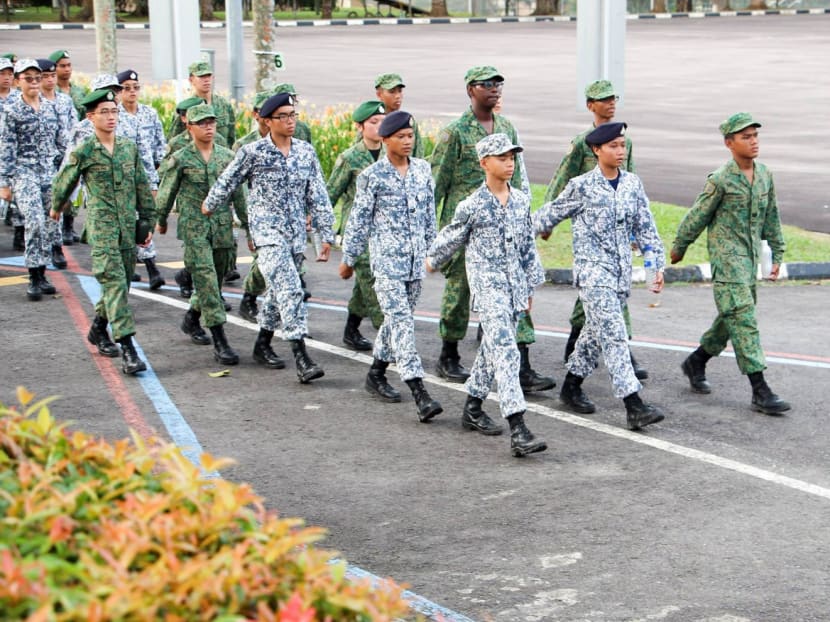How the NCC can continue to help build resilience
Singapore is commemorating 50 years of National Service (NS), with the community lauding the contributions of all national servicemen.

Many teenagers in Singapore join the National Cadet Corp as a co-curricular activity because they want to experience the same sense of pride as those who don the green uniform of SAF servicemen. Photo: National Cadet Corps — Singapore
Singapore is commemorating 50 years of National Service (NS), with the community lauding the contributions of all national servicemen.
However, not many know that we have another landmark to celebrate this year — the National Cadet Corps (NCC) marks a remarkable 116 years since it was established.
As Singaporeans reflect on their own NS experiences, we are reminded of the deep resilience needed to safeguard and protect our country. Beyond simply sharing the same day of remembrance on July 1, the Singapore Armed Forces (SAF) and the NCC are two institutions that have been instrumental in shaping this concept of resilience.
The NCC first showed me what resilience truly meant when I was a budding cadet in secondary school, and I have carried this value throughout my days as a Cadet Lieutenant, and subsequently when I led students as an NCC Teacher Officer.
Like many teens, I joined the NCC as a co-curricular activity because I wanted to don the same green uniform as SAF servicemen.
To me, it signified a coming of age and brought a sense of pride, knowing that it is the same uniform that Singaporeans wear when they defend our nation.
The Teacher Officers in charge of my NCC unit always emphasised this sense of pride. We were told that we would develop the same kind of resilience and discipline that SAF servicemen demonstrated.
This training arose from the strict regimentation that my NCC peers and I experienced, from the way we dressed to the way we marched.
I recall that the first lesson in our NCC training was on how to fold our sleeves for the smart No 4 attire.
At home, I also watched intently as my mother showed me how to starch my collar, while my father shared with me the finer points of polishing my boots, something he learnt in his NS.
The sense of discipline permeated almost every aspect of my early NCC training. This helped me transition easily to NS.
Coming full circle, I was given the opportunity to lead a secondary school as a Teacher Officer during my stint as an educator.
I have had no doubts that my NCC experiences have made me a better son, colleague and citizen.
Indeed, there is much the NCC can do to build discipline and resilience among our youth in a fast-changing world.
MAKING NCC MORE RELEVANT
For one, the NCC’s partnership with the SAF has seen more military-related programmes introduced, with cadets participating in learning trips to overseas exercises.
During these trips, the cadets observe live-firing exercises and catch a glimpse of the life of a soldier operating in the field.
These opportunities help cadets discover how we have developed our military capabilities over the years. It also lets them know that they, too, have a stake in our collective growth as a nation.
The NCC has also built ties to other Cadet Corps around the world, such as the famed Junior Reserve Officers’ Training Corps (JROTC) in the United States, with which the NCC has also conducted overseas exchange programmes for cadets.
From my interactions with our counterparts, the JROTC programmes do not seek to encourage students to join the military.
In fact, the military veterans-turned-instructors teach transferrable skills with the goal of paving their route into college.
Similarly, the real value of the NCC is on ensuring that the leadership and discipline instilled among our youths endure from their education years right through to their careers. This will be invaluable as traditional norms are increasingly disrupted by technology and evolving security threats.
To remain relevant, the NCC has to start with our increased vulnerability to cyber attacks.
It can be argued that warfare, once fought by soldiers on the battlefields, is now hybrid in nature and carried out much closer to home. Critically, this hybrid warfare requires everyone to play a part, including the young.
In this respect, the NCC can continue to maintain its relevance among the youth by creating awareness in the face of cyber terrorism and defence.
As the SAF has made huge strides training soldiers to deal with future cyber threats, the NCC can play a crucial role in ensuring that our youth are also exposed to such concepts at an early age.
We can tap the expertise of trained SAF personnel to conduct courses on coding, programming and even robotics. Furthermore, NCC cadets should explore the possibility of participating in community emergency preparedness programmes such as the SGSecure movement, and put their first aid skills to good use.
Singapore will always be a small country that has to be responsible for its own security, and I am optimistic that we will continue to be able to protect ourselves and our way of life.
If the past 50 years has shown anything, it is that we have proved to be an unwavering, rugged lot, unfazed by struggle and able to cope with a fast-changing world.
ABOUT THE AUTHOR:
Melvin Lee is an assistant manager in a student care centre. As a student in the NCC, he attained the rank of a Cadet Officer and served at his alma mater, Bartley Secondary School. He continues to serve the NCC as a volunteer adult leader, marking a 15-year relationship with the Corps.






